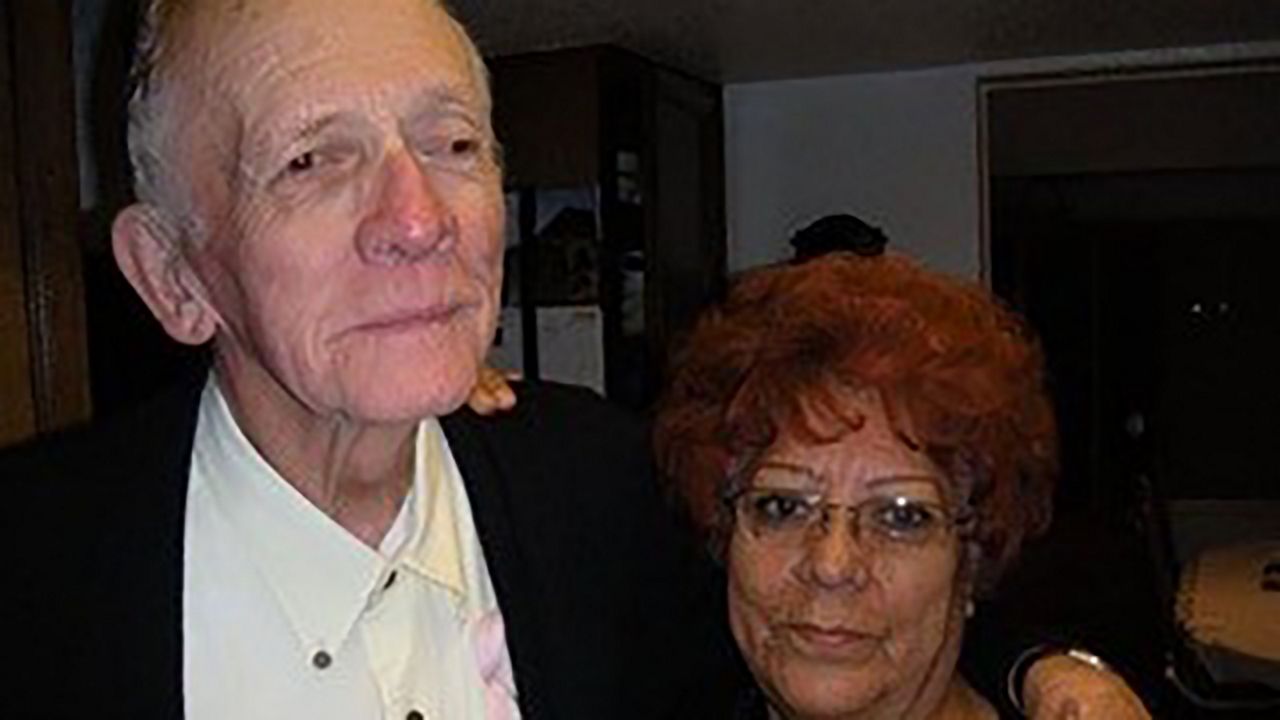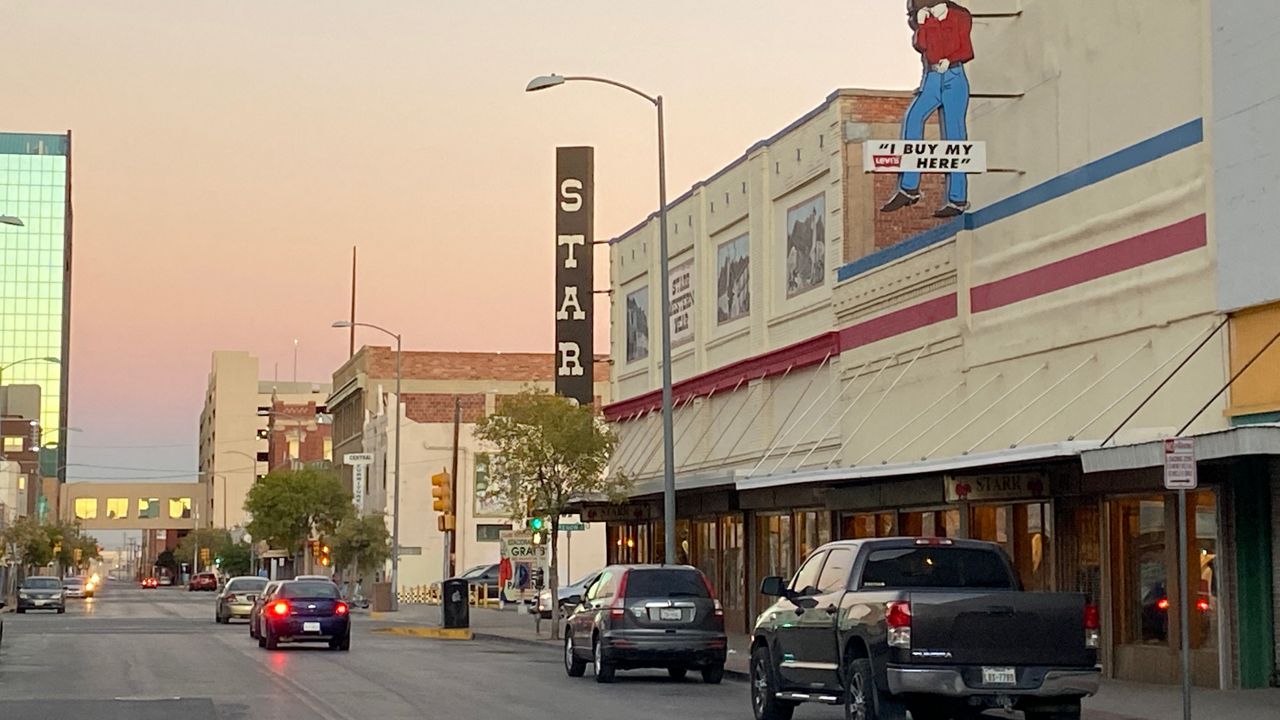EL PASO, Texas — The death toll from El Paso’s deepening coronavirus crisis continues to rise, and Lee Ann Holman is grieving.
The 34-year-old native El Pasoan lost her grandfather to the disease on Thursday. Like so many other elderly patients stricken by the illness across the country, William Holman, 86, died as his family said goodbye to him via a video call.
Now, his granddaughter Lee Ann is pointing her finger at politics and, in particular, the Texas politicians she says care more about the economy than they do about saving people’s lives.
On her Instagram, Lee Ann Holman posted a photo taken in happier times of her grandfather with his arm slung affectionately around her grandmother’s shoulder. The couple was married for 67 years.
“Texas politics killed him,” she wrote. “Wear your damn mask and stop hanging out with people!!”
The politicization of the pandemic has played out across the country. The tug-o-war in El Paso this month between local governments, business owners, and the state is just the latest example of how divisive politics has poisoned the process of trying to control the coronavirus. Despite being a traditional Democrat stronghold that President-elect Joe Biden carried with 66% of the vote this month, Pres. Donald Trump did 6 percentage points better in El Paso this year than in 2016.
Tensions reached a pinnacle in this border town right before the election in late October, when infection rates soared to over 1,000 new cases a day and hospitals reached capacity. Hoping to curb the spread, El Paso County Judge Ricardo Samaniego, a Democrat, issued an order to shut down all nonessential businesses beginning on Oct. 30 for two weeks. Local business owners were infuriated. Pandemic fatigue and a struggling economy had set in, and everyone dreaded another lockdown.
Political fissures seemed to deepen after Samaneigo’s order.
“There's tremendous frustration that has come out as political expression,” said Richard Pineda, an associate professor of communication and director of the Sam Donaldson Center for Communication Studies at the University of Texas at El Paso. “So, people explain what is happening is that it's either the Democrats trying to make this political and or Republicans trying to do so.”
“El Paso is a microcosm of the way COVID got politicized nationwide,” he said.

Texas Attorney General Ken Paxton, a Republican, jumped in the fight by joining a group of El Paso business owners in asking the courts to have the order halted. Paxton said the order exceeded the restrictions permitted under Gov. Greg Abbott’s order outlining which limits can be placed on businesses.
Days later, a state district judge ruled in favor of keeping the order in place, and the state attorney’s office appealed. Judge Samaniego announced on Nov. 11 that he was extending the shutdown order for three more weeks.
But on Friday, the Eighth Court of Appeals in El Paso issued its final opinion, lifting the shutdown order and allowing businesses to reopen.
Paxton applauded the court’s decision, calling Samaniego a “tyrant who thinks he can ignore state law.”
“This has been a very political pandemic that’s taken out a president and destroyed an economy,” said Frank J. Ricci Jr., the owner of the three Rockin’ Cigar Bar & Grill venues in El Paso. “It's just separated us and made everyone get on two different sides of the fence here.”
Meanwhile, death rates have mounted, reaching 762 since the beginning of October. More than 50% of the city’s COVID patients were hospitalized, stretching the limits of the city’s facilities and staff. The state sent in some 1,400 extra medical workers to help.
“It is a real virus, and when you have almost 800 out of 800,000 dead... but at the same time, you can't have 800,000 people get beat up on this economically, either,” Ricci said.
The government’s responsibility is to inform the public about what the virus is, who’s vulnerable, and what we need to do, and let the people make up their own minds about how to proceed, Ricci said.
The frustration with the county judge’s order shined a spotlight on the surprisingly deep political divisions in the city, he said.
“There is a lot of Trump support not just here, but in a lot of the bars I've been in. I’m surprised at how he's able to touch some nerve, even in a town like El Paso,” Ricci said.
El Paso’s medical examiner has set up 10 mobile morgue units in its parking lot. Lee Ann Holman said she hoped her grandfather hadn’t been placed there.
His wife, Sofia Holman, daughter and her former husband, all of whom shared a house in El Paso, also got COVID and are currently recovering, putting a delay on arrangements for William Holman’s funeral services.
“It’s infuriating to watch the government and attorney general suing the county judge while so many people are suffering,” Holman said. “I know the nation is divided, but I don’t care about the economy if there are no people left to spend the money.”
The crisis has also forced tensions between the county judge and Mayor Dee Margo to spill out into the public.
Samaniego made his first announcement about the shutdown order via teleconference in which he was joined by El Paso’s political and medical leaders, including U.S. Rep. Veronica Escobar, a Democrat.
Margo was not included and later said that he was not consulted on the decision.
In a press conference last week, Margo said his calls to the county judge were not being returned. A local reporter said the county judge’s office told him the mayor’s office had blocked Samaniego from calling into the press conference.
Suddenly, the mayor and county judge appeared to be in an ugly game of phone tag during a national crisis, with the whole town watching.
The recent fight over the lockdown order could not have come at a worse time for Margo, who faces a runoff on Dec. 12 against a local car dealership owner and former mayor, Oscar Leeser, who is challenging his re-election for a second term.
Neither candidate received the required 50% to win on Nov. 3, so the two are now in a tight fight to run the city of 680,000.
Margo received 24.7% of the votes and Leeser received 42.5%, according to the latest figures from the county elections department.
“Some of this is definitely provincial, El Paso style politics, but for the mayor, this is all about optics, and the optics are just bad,” Pineda said.
El Paso’s mayor and city council members are nonpartisan as per the city’s charter.
Margo, however, served one term as a Republican in the Texas State House from 2011 to 2013, so his party affiliation is widely known. In his first mayoral campaign, he touted his experience and understanding of how the inner halls of the Texas government operate and his relationship with Abbott as one of the reasons to support him.
El Paso is a time zone and 575 miles from Austin, and there’s an undercurrent of feeling here that the rest of Texas treats the border city like a forgotten stepchild.
“It’s a chip, albeit a very polite chip, on our shoulder in a very El Paso way,” Pineda said.
With the pandemic raging in his Western corner of Texas and an onslaught of frustration from local business owners as well as grieving families, Margo “is probably in the same position the president was in coming into this election cycle,” Pineda said.
It may not matter what Margo has done in the first three years of his four-year term as El Paso mayor because the last six months of COVID derailed everything in terms of his political liability and in terms of his ability to message effectively, he said.
As it was for Trump with many voters across the country, the way people vote is largely going to be a referendum on whether people think Margo has handled the COVID crisis well, Pineda said.



